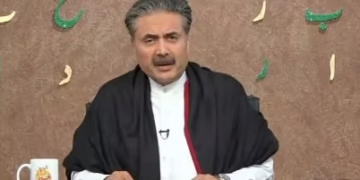Karachi 06-11-2024 – The founder of Aam Loeg Itehad, Justice (Retd) Wajihuddin Ahmed, stated that
interference with Pakistan's armed forces and the higher judiciary has historically proven
detrimental for unpopular governments. He cited the example of Field Marshal Ayub Khan, whose
tenure saw three extensions when the first martial law was imposed in 1958. The attempt to appoint
preferred judges has been an unsuccessful tradition.
Justice Ahmed remarked, “This time, what has happened to the higher courts is comparable only to
the actions taken during Pervez Musharraf's regime.” He pointed out that extending the tenures of
military commanders up to five years and expanding the number of seats in the Supreme Court from
17 to 34 reflects an authoritarian rather than a democratic approach.
Referring to the controversial election of February 2024 and the 26th constitutional amendment,
which saw votes from coalition and other parties, Justice Ahmed called these events signs of
corruption. He further criticized amendments to the Anti-Terrorism Act, which allows for detention
of suspects without court approval for up to 90 days, as well as the expanded terms and posts in the
Supreme Court, noting these changes mirror an authoritarian system.
Ahmed observed that Pakistan's history, from Ayub Khan until now, is filled with similar examples.
He cited instances like Iftikhar Chaudhry, a judge appointed under the PCO (Provisional
Constitutional Order), who opposed Musharraf; Bhutto's selection of Zia as army chief in his seventh
year; and Qamar Javed Bajwa, who aligned first with Nawaz Sharif and then with Imran Khan,
resulting in an extension. The retired justice remarked, “Whenever Pakistan’s armed forces or
judiciary are tampered with, unpopular governments inevitably pay the price.”
Reflecting on Musharraf's November 2007 reshuffle, Justice Ahmed pointed out that attempts to
install loyal judges ultimately backfired when the restored judiciary sentenced Musharraf to death.
The current constitutional amendments doubling the strength of the Supreme Court will likely face a
similar fate. He added, “During my tenure, the approved number of judges was 17, but only 13 could be
appointed due to the need for qualified and experienced judges.” Highlighting India's Supreme
Court, which has the same number of judges to serve a population of 1.4 billion, Ahmed noted that
Pakistan’s economy cannot bear this burden, with recurring issues regarding judges’ salaries and
privileges.

















